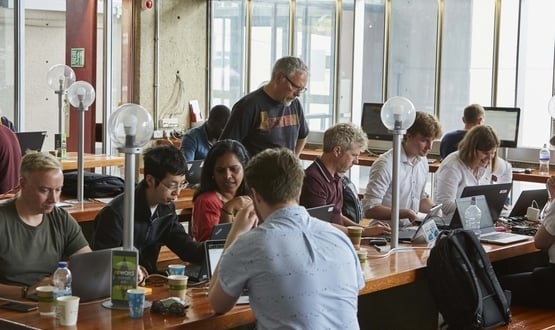IT leaders pull up their pink socks for Summer Schools day one
- 18 July 2019

The Digital Health Summer Schools 2019 has kicked off with international keynotes from Nick Adkins, John Halamka and Margunn Aenestad.
Beginning proceedings for the first day was Nick Adkins, founder of the pinksocks movement.
Adkins touched on the importance of maintaining human connections in the industry, notably by ensuring the patient story doesn’t “get lost in the technology”.
Pinksocks is a not-for-profit organisation based on the concept of “gifting” to build networks and contacts – an ethos Adkins took away from a Burning Man festival in 2010.
The signature pink socks are intended as a conversation-starter that encourage people to connect – an ethos that Adkins said he wished to see more often in healthcare.
Addressing delegates at the Digital Health Summer Schools on 18 July, Adkins said: “In healthcare there are so many challenges – the technology, the burnout. We deal with a lot of data. Every data point is a person, a story, and sometimes we forget that.
“Listen to the patient story, really see them, and don’t let that get lost in the technology.”
Adkins said the pink footwear wasn’t mandatory, though: “Find your own thing that causes someone to look at you and say ‘hey, let’s talk’.”
Hearts and minds
Dr John Halamka was the second speaker of the morning.
The CIO of Harvard’s Beth Israel Medical School discussed the importance identifying opportunities for healthcare initiatives based on local needs, while exploiting the strengths of technologies to hand.
He also raised the ever-burning issue of how digital technology and new ways of working can be introduced without increasing the burden on clinicians – a challenge he suggested had failed in the US.
“We got to digitisation, but we lost the hearts and minds of all our clinicians along the way,” Halamka remarked.
“How do we figure out what goals are most important? We need to figure out how to create benefit to patient and clinicians and ecosystem, while reducing the burden.”
For local communities in India, where there is limited access to healthcare professionals, Halamka explained that “entrepreneurial models” had been set up to connect remote communities with their clinicians.
Using readily-available 4G networks in India, patients can be evaluated by clinicians using smartphone-based telehealth and telecare, via a locally-nominated health worker.
By capitalising on its existing infrastructure, Halamka suggested India is poised become a “world leader” in telemedicine and telecare.
Approaching IT problems differently
Halamka’s advice was echoed by Margunn Aenestad, whose keynote centred on the theme of complexity in the healthcare system.
Aanestad, a Professor of the University of Oslo, argued that large healthcare projects were hindered by their scope and prone to “external interference”.
“I think we could approach IT problems differently,” she told delegates.
“I think we cause unnecessary complexity when we approach IT projects.
“Sometimes processes are too big to be organised as a project…it doesn’t fit always, they are limited time, they are outside of usual operations.”
Aanestad thereby suggested that healthcare innovation required “a more interactive, adaptive approach”.
“Think about what you have here and now, don’t just think about how nice the goal will be,” she told delegates.
“Think about the transition path, how to get from A to B.”
This involves making the best use of the resources already available. “We are not doing well enough to keep up with possibilities we could exploit,” the professor added.
“[But] this does not mean we need to always introduce something new or kick out all systems or practices, or should strive for radical change.”
“Convert milestones into decision points, rather than deliverables.”
The two-day residential Summer Schools is the largest gathering of local and national NHS IT leaders. The annual meeting is dedicated to all 3,000 members of the Digital Health Networks, the community for UK health IT leaders.
Follow the latest news from the event at @DHSummerSchools




